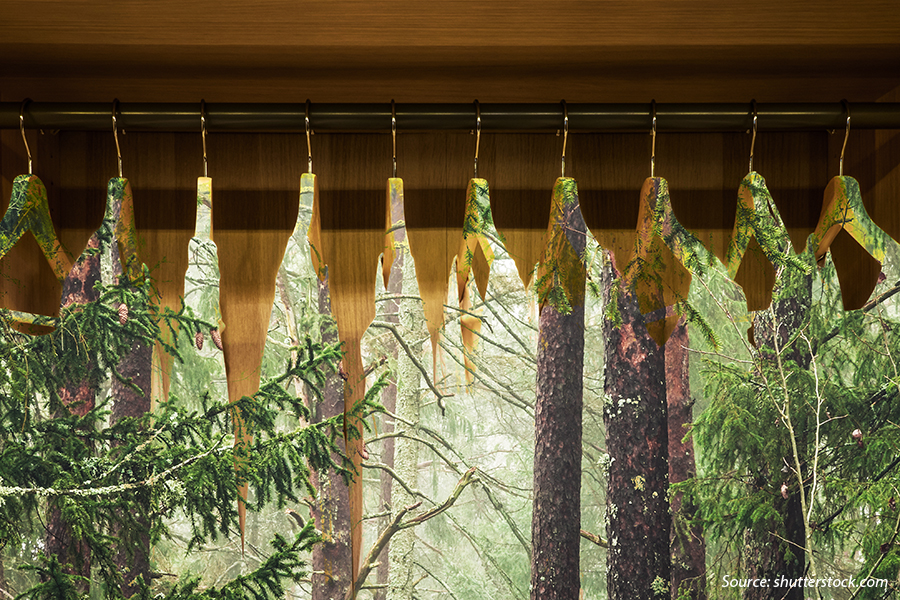
Clothes hanger with dresses in the forest. Concept for organic clothes, closet and sustainable fashion.
According to a report by the United Nations, the fashion industry accounts for about 10% of global carbon emissions, and nearly 20% of wastewater. While the environmental impact of flying is now well known, fashion sucks up more energy than both aviation and shipping combined. The textile industry has been identified in recent years as a major contributor to plastic entering the ocean, which is a growing concern because of the associated negative environmental and health implications. Speaking of waste, 85% of our used and unused clothing ends up in a landfill.
You’d probably need a minute to digest all those shocking facts, but the planet needs centuries to degrade all the plastic and waste that is being generated by the fashion industry as well as the consumers. While people need to look at slowing down and rationing their consumption dramatically, the retailers need to go full force towards an absolute revolution in favour of the planet we live in.
These are legacy businesses that were built around a specific business model that has had to pivot to adapt to changing demands and trends in the market. However, certain companies were established purely on a sustainable business model with the core values, business proposition, and products based on this philosophy.
Preloved and resold
One of them is the preloved and resold model of business or the second-hand sale of clothes that have created a ripple in the market. Searches for luxury resale products have increased by a massive 255% since 2018.
Conceptualised by founder and CEO, Sian Rowlands, Retold – re-branded from My Ex Wardrobe – is a pre-owned fashion retailer that was launched in 2011 with the aim of providing sustainable fashion options to consumers in a market that was driven by the biggest brands and retail concepts that thrived from the use-and-throw habits of customers.

My Ex Wardrobe was born out of Sian’s passion for a cause, her love for high street fashion and a gaping hole in the market for preloved clothes. The business grew and was rebranded in 2018 with the opening of a 3,000 sqft boutique, spanning across two levels, on Dubai’s Umm Suqeim Road, which has now moved to Warehouse 11 in Al Quoz, as well as a website, shopretold.com, which houses 10,000-plus unique pieces available for delivery.
“The retail landscape here is decades behind compared to elsewhere in the world. So if you look at the US or the UK, up to 20% of the fashion retail and fashion retail high street is actually resales. So that’s charity shops, consignment shops, or resale outlets. In the UAE, it’s less than 0.1%. There’s a tiny handful of us, you know?”, she said.
But why are people in this region still averse to the idea of second-hand goods, especially second-hand clothes? Is it because they think it is beneath them to wear another person’s used clothes – a prestige issue? Is it because old habits of constantly changing your wardrobe with new trends emerging seasonally die-hard? Or is it because there is a perception of going eco-friendly to be more expensive?
“From a layman’s point of view sustainability is always equated to just going green. But that’s not only where sustainability sits. Sustainability is about a socio-economic impact as well. If you shop sustainable fashion, not just second-hand but ethical fashion too, the people who make the products are actually paid a living wage, unlike fast fashion where products are manufactured by people living under a minimum wage”, she explained.
“Sustainability doesn’t have to be expensive and it shouldn’t be expensive. With what we are doing, the idea is to expand a product’s life cycle. The bigger brands have been successful in creating an addiction to fast fashion and throw away fashion. We shouldn’t be buying an item of clothing that has taken 3000 liters of water to make and throw it after wearing it once.”, she said.
Once people understand the ecological and social-economic impact of moving to sustainable options, they are likely to be more comfortable with wearing second-hand clothes. Moreover, 25% of clothes at Retold are brand new and a further 25% of the clothes that are sourced from individual sellers have never been worn.
There are 150 billion items of clothing that are produced globally every single year and 150 billion items go to landfills. “So at the moment, we’re consuming one for one and it’s horrible. We’re just a tiny drop in the ocean at trying to expand the life cycle and lifespan of those products and trying to reduce the carbon footprint of pieces that have already been made”, she said.
But people’s perceptions in the region are slowly changing and the success of Retold as a concept is a testament to that. The pandemic has also made people tight on their pockets as a result of which people are looking for the more affordable options, which a second-hand business model provides.
Rental Revolution
Another change that is taking place in the fashion space that is aimed at mitigating all its negative impact is the rental revolution. The UK clothing rental market is predicted to be worth $3 billion by 2029, according to GlobalData. Rent the Runway from the United States closed a whopping $125 million in funding last year. This goes to show that people are now accepting the idea of a ‘one-night-stand’ (as The Guardian put it) with dresses, especially for red carpet events and glam nights. The revolution is slowly finding its way into the Middle East with retailers like Best Kept Shared jumping on the bandwagon of creating a whole business solely focused on rental fashion.
Best Kept Shared is Dubai’s first peer-to-peer fashion rental platform founded by Kelly Power and Sophie Kjoller. It is a two-sided marketplace where a lender can monetize their luxury apparels, which they already have in their closet, and a renter gets to use the item for a fraction of its market price.
“We are trying to build a platform that gives exceptional access to the coolest luxury closets in the city, which is built on a very strong tech foundation”, said Kelly Power.
So how are they making money out of this model? If an item is rented for four days, it is listed at 15% of the retail price of the dress. They then take a 15% commission on the lenders’ side as well on the rent. “It’s as functional as an Airbnb”, they said.
Power and Kjoller have a similar objective as Rowlands in extending the lifespan of clothes. “The average individual buys more than 50 items a year, and at least 50% of the wardrobe is worn less than three times. We can blame it on the rise of Instagram. We’ve seen that a constant need for newness isn’t going away, but it’s also not sustainable. So we provide a solution that fixes that need for constant newness, that doesn’t cost the planet”, they said.
Covid-19 hasn’t quite helped the cause as people aren’t comfortable sharing anything with a stranger, let alone a used item of clothing. However, once things go back to normal, there is a business case for every person who owns luxury clothes they seldom wear to make money out of the dresses that just sit in the cupboard and lose their value over time.
“Monetize your wardrobe and get that return on investment”, they said. “If you’ve got items in your wardrobe that are not currently being used, you should put them back into the circular fashion economy in some way, shape or form. So whether that is through resale platforms or by listing it on a rental site, like best kept shared, the trend is and should definitely move that way”.
So with all the advantages that the sustainable brands, retailers, and concepts bring to the table for the environment, economies as well as societies, it is time that people start shouting proudly from the top of their roofs about going green and sustainable by buying second-hand clothes and wearing rented outfits as these things are – like Power and Kjoller say – best kept shared.
All eyes on Jawharat Riyadh: Cenomi Centres redefines the concept of shopping centres
RetailGPT – Defining a Collaborative Future for the Phygital Retail Industry
Cegid Launches its Point of Delivery (PoD) to Serve Middle East Market
#ConversionChronicles: Unveiling the magic behind e-commerce success
You must be logged in to post a comment.